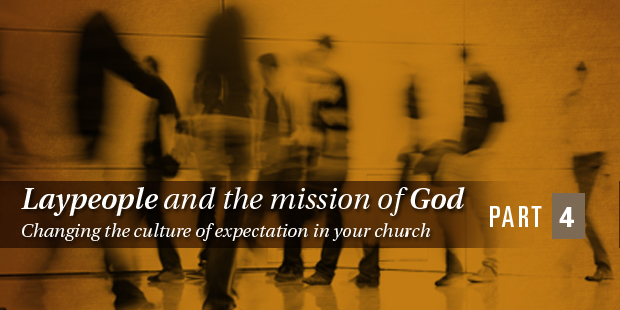
Laypeople and the Mission of God, Part 4
Today I continue my series on laypeople and the mission of God. If you have been following this series you know how I don’t like the word “laypeople.” At the end of the series, I am officially declaring it off limits for a while. A few of you may have a moist eye, and I may have a sniffle or two, but we must move to the future with a different and higher view about what God wants done. Simply put, all God’s people are called to the ministry (1 Peter 4:10), and all God’s people are sent on mission (John 20:21).
One of God’s greatest resources to fulfill His mission is people who are currently doing little to nothing– and they have been taught that is what they are supposed to be doing. Churches are filled with passive spectators rather than active participants in the mission of God.
As I explained in an article for Q Ideas, millions of people live in the shadow of churches that have become consumer Christian centers. The mission of God is being cheated while consumer Christians enjoy the programming. In their book, God is Back, John Micklethwait and Adrian Wooldridge described the state of the American church as the “Disneyfication of God” or “Christianity Lite – a bland and sanitized faith that is about as dramatic as the average shopping mall” (p. 189).
Believers who think like customers contribute to the underachieving church in America (and the West in general). But hold on. I believe the mentality in the pew (or cushioned chair) may have another contributing factor: pastoral codependency.
First, let me define a term codependent. I got this from Wikipedia–because you can trust everything there. “A codependent’ is loosely defined as someone who exhibits too much, and often inappropriate, caring for persons who depend on him or her… A ‘codependent’ is one side of a relationship between mutually needy people.
A codependent pastor needs a needy congregation. And we have too many of both. But relishing the applause that comes from being the local church superstar often results in performance anxiety and utter disappointment in an underachieving church. It is a vicious cycle where everyone ends up disappointed–including God.
So who started all of this dysfunction? Was it the needy, consumer-driven congregation? Or was it the pastor, hungry for significance? The pastor who insists on being the focus of local ministry trains the body of Christ to sin. Believers who demand all ministry to be done by “professionals” lead the pastor to sin. To break the cycle, the enablers must stop enabling. God cannot receive glory in the church when pastors are always up front receiving the credit.
I am a pastor and I love pastors. I don’t think they caused the problem and I am so thankful for the sacrifice they make. Actually, that willingness to sacrifice, to DO for others what God has called them to DO, is from the right heart but with a bad result. It hurts the church and it hurts the pastor.
We need to understand everyone’s role. When pastors do for people what God has called them to do, everyone gets hurt and the mission of God is hindered. God designed the church to act as the body of Christ. Here is what it should look like: “Based on the gift they have received, everyone should use it to serve others” (1 Peter 4:10). “A manifestation of the Spirit is given to each person to produce what is beneficial” (1 Corinthians 12:7). The church is most alive when every believer serves in the mission of God where assigned by the Spirit.
Wherever we live, it is a mission field. However, too often, we say we live in a mission field but don’t engage the mission force– the people of God.
Now, I am a believer in pastors– and see that there is a pastoral office. I am not looking to undermine that. However, we have swung way too far the other way in most churches– with rooms of spectators rather than servants, customers rather than co-laborers.
The average person sitting in the pew (or, more likely today, the padded chair) on Sunday is bored, unengaged, and under challenged. If he/she is not absolutely jazzed by babysitting preschoolers or helping park cars on Sundays, many churches have few other options.
Thus, I think it is essential to change the culture from passivity to activity and to break the consumer Christian / co-dependent pastor cycle.
Starting in my next post, I will walk through four essentials to changing the culture of your church to engage all God’s people in mission.
Read prior posts from this series here: Part 1; Part 2; Part 3.
Read Part 5.
Read more from Ed here.

Tags: Ed Stetzer, Serve, Staff Leadership Roles













